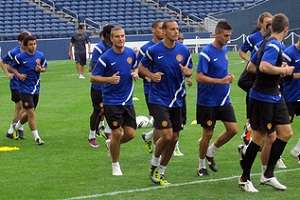Vigorous evening exercise not detrimental to sleep quality

A paper published in the European Journal of Sport Science found early evening high-intensity training had no significant impact on sleep quality and quantity in elite youth soccer players.
Neither did cold water immersion (CWI), a method commonly used by athletes after training to quickly decrease their core body temperature which may have spiked during exercise.
In the study, conducted by lead author Elisa Robey and colleagues at the UWA School of Sport Science, Exercise and Health, 12 elite male youth soccer players who normally employed CWI after training were asked to wear an actigraph (wrist activity monitor) while sleeping.
Using the wrist actigraphy, the players' bedtime, wake time, sleep duration, sleep onset latency (amount of time taken after going to bed, to fall asleep), the percentage of time spent asleep while in bed, and the amount of time spent awake after earlier having fallen asleep, were measured three nights a week over seven weeks.
After early evening training (TRAIN) the players woke up significantly later the next morning compared to when they had stayed home (HOME).
"It was encouraging to see that athletes utilised the rest day – the day after high-intensity evening training – to spend more time sleeping," Ms Robey says.
Also, on a TRAIN night, players went to bed later in the evening compared to a HOME night, and rated their levels of sleepiness at bedtime higher compared to when they had completed post-exercise CWI.
However, there was no significant overall difference in the sleep quality and quantity measures between the TRAIN, TRAIN+CWI and HOME conditions, suggesting vigorous evening exercise might not necessarily make sleep difficult.
"The desired outcome of the study was to provide more information to coaching staff about players' sleep patterns after high-intensity training and the effect of CWI, performed post high-intensity exercise, on sleep," Ms Robey says.
"It would be unreasonable to look for alternatives to CWI on the basis of these results, as this research does not show any negative effect of CWI on sleep.
"[Other studies] also suggest that players don't necessarily have to avoid high-intensity training nights in order to get a good night's sleep.
"However, if later training sessions are scheduled it is important to allow players to still gain the required amount of rest by not scheduling next day early training sessions."
More information: "Sleep quantity and quality in elite youth soccer players: A pilot study." Robey E, Dawson B, Halson S, Gregson W, Goodman C, Eastwood P. Eur J Sport Sci. 2013 Oct 4. [Epub ahead of print]

















